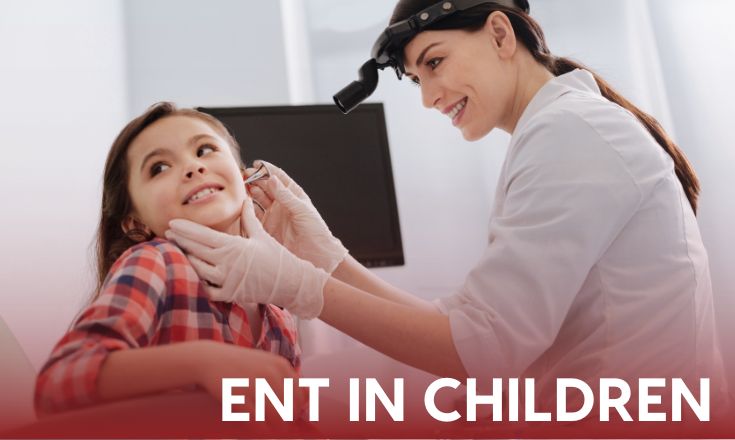Children are very resilient. From the age of 6 months to 2 years, a child has a developing immune system and will succumb to various viral and bacterial infections and will develop immunity from it. All children are equally susceptible to common cold and seasonal flu, it is a very natural process of their growth.
Taking into consideration their growing bodies and the fact that their muscles and bones are still growing, a lot of functions we take for granted are still being mastered by a child or are yet to start in them.
Unnecessary prescriptions of antibiotics or steroids have to be avoided to let them help fight off infections by themselves and develop a more innate immunity towards that specific antigen. Breastfeeding a child is when the mother passes her own immunity to the child to ensure the child is protected in those early few months of its life.
Common ENT problems in children:
Our Nose is the first defence mechanism our bodies have to filter out most of the inhalational pathogens that we encounter in day to day life. Our bodies are quite miraculous and wonderfully designed to ensure we remain protected, when a function of a particular system or organ is hampered is when we start going down the path of sickness.
Especially in ENT where all three systems are interlinked and there is no way to treat one without addressing the other two, they go together quite beautifully so as to ensure flawless function of our inbuilt defence systems.
Rhinitis
Inflammation of the mucosal membranes of the nasal airway is known as rhinitis. It will result in excessive secretions of mucous from the nose and lead to a runny nose and stuffiness inside the nose.
Causes:
- Viral infections
- Bacterial infections
- Inhalation of toxic substances
- Foreign bodies in the nose.
Treatment
Depending on the etiology and the severity of the symptoms your treating physician may recommend anywhere between a simple saline nasal douching to antibiotic course.
Serous Otitis Media:
Collection of mucus entering into the middle ear cavity from the nose is called serous otitis media, in this condition the eardrum or the tympanic membrane is intact. It is also known as glue ear. The quantity or the type of fluid is dependent on the duration or type of infection.
Causes:
- Untreated or undertreated cold.
- Air travel or activities involving pressure changes while harbouring a cold.
- Forcefully cleaning the nose either by blowing or sucking in the mucous.
- Adenoid Hypertrophy.
Treatment:
The duration and the viscosity of the fluid along with few hearing tests like Pure tone audiometry and impedance audiometry will give us a better look as to how best manage the condition to restore the child’s hearing.
Adenoids
Adenoids are lymphatic tissues that are located at the junction between the nose and the throat, hypertrophy[increase in the size and density] of this tissue will result in blockage of this airway and result in recurrent episodes of common cold and sleep apnea in children.
Causes:
- Viral infections
- Bacterial infections
- Allergic hypertrophy
- Acid reflux.
Treatment:
Once the cause of the disorder is identified then the treatment is given accordingly, the size and the duration of adenoids will have a definite say in the mode of management. Untreated adenoids will have a permanent effect on the growth of the child, facial shape and their overall immunity.
Tonsillitis
Tonsils are the biggest naturally occurring lymphoid tissue which are present from the time of birth, they are our defence system in the early few days and months of our birth. Tonsils similar to the appendix has no allocated function to it. Infection and swelling of the tonsillar gland is tonsillitis
Causes:
- Viral infections
- Bacterial infections
- Poor oral hygiene
- Traumatic injury to the gland.
Treatment:
Tonsillar infections in a child are very common and easily treated with antibiotics, in stubborn infections sometimes admission of the child may be advised to ensure proper hydration and nutrition of the child while giving stronger antibiotics. Repeat episodes of tonsillitis requiring recurrent use of antibiotics must be removed surgically.

